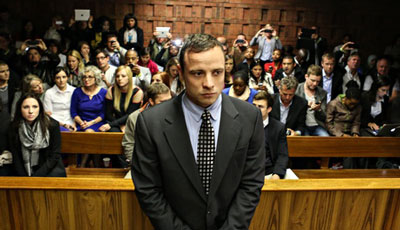Cameras will be in British courts ‘within five years’ claims former top prosecutor

Cameras could broadcast live from criminal courts in Britain within the next five years, the ex-top prosecutor Keir Starmer has predicted.
The former Director of Public Prosecutions said the heightened interest in trials televised abroad such as that of Oscar Pistorius strengthened the argument for cameras in UK courts.
In his first interview since stepping down last October, he said it was ‘odd’ that the public know more about the legal system in other countries than our own, where footage is banned.
‘The case for cameras in courts really gets stronger and stronger,’ he said. ‘The principle is open justice and there’s a disconnect between the fact we’ve got a right to walk into any court but it can’t be screened. Most people don’t have the time to go to court and therefore they don’t know what’s going on in courts.
‘And it is odd that I suspect in most households the legal system in Italy because of the Amanda Knox case, in South Africa because of the Pistorius case and then the US because of OJ Simpson are better known than their own legal systems. Most people know something about those cases.
‘When you cut all that with the fact you can now use Twitter in court, the case becomes compelling.’
He told the Mail: ‘I think that there’s only one direction of travel. I would be very surprised if in the next five years we haven’t moved on again.’
Since he first cautiously backed the idea trials three years ago, he said screening of the Court of Appeal and the Supreme Court had gone ahead successfully and it is now a ‘moving issue’.
He suggested courts could start by putting sentencing hearings on camera, and over time extend their reach to witness testimony.
Mr Starmer, a human rights barrister at London’s Doughty Street chambers, dismissed criticism that putting trials on television would cause witnesses to play to the cameras, saying there was no evidence of this from other countries.
In disturbing scenes from the Pistorius trial – which returned to TV screens this week – the athlete is seen breaking down in tears while giving evidence.
But Mr Starmer said: ‘I think it’s only a soap opera because it’s the only one. If you say no cameras, and its therefore a very odd and strange thing, it becomes sensational. The way to deal with that I think is to make it the norm across all cases.
‘If you look at any of the big cases of the past week, Max Clifford or Constance Briscoe, they are headline news because the public want to know about them. And what you get is journalists at court describing in detail what’s happening, so you don’t avoid that by not having a camera. Make it the norm and it becomes the norm.’
But Mr Starmer, who is working on a justice review for the Labour party which will include new proposals for a Victims’ Law, warned that judges would need powers to exempt evidence from vulnerable people or children from being broadcast.
He said similar arguments were made against live television broadcasting from Parliament, which was only allowed in 1989, around 60 years after it was first proposed.
‘It’s a moving issue now, it’s gradually changing and I think we will get there and it will then become the norm’, he said. ‘It has become the norm with Parliament.
‘There was great worry that if Parliament was televised people would act to the camera, but we now regularly see clips on the news and people know more about what it does and that’s a good thing.
‘I think opposition to the idea is lessening. By seeing trials, the public will better understand what’s going in. But I also think the scrutiny would improve criminal justice.
‘If a torch is shone, that tends to improve things. Speed and efficiency of cases would be improved. Our legal system sometimes moves slowly and constant scrutiny helps with issues of efficiency.’
The ban on cameras in court has been in place since the Criminal Justice Act 1925.
Among critics of overturning it are the Lord Chief Justice, Lord Judge, who has warned televising criminal trials would be disruptive and deter witnesses from giving evidence. He said there had been incidents in New Zealand when it was introduced of ‘cheers and boos’ from the gallery.
Helena Kennedy QC, also a leading human rights barrister and peer spoke out against cameras in courts six months ago. She said television ‘seeks the salacious and the sensational’.
She said: ‘Such exposure will put witnesses off, discourage victims even if their faces are not on screen and distort the behaviour of lawyers and judges.’
She added: ‘Fear and anxiety will multiply for those involved and public trust will decrease… Transparency does not mean the whole country has to see highlights like the goals in a football match.’
The Ministry of Justice say they intend to extend filming into crown courts for sentencing ‘in due course’ but no date has been given. Last year Helen Grant, then a justice minister said: ‘We believe televising court proceedings will help improve transparency and bring greater public confidence and understanding of the criminal justice system.
‘We want to modernise the system and make the courts accessible to the public, whilst ensuring correct procedures are in place to safeguard all participants.’
(By TAMARA COHEN)
Source: dailymail



























